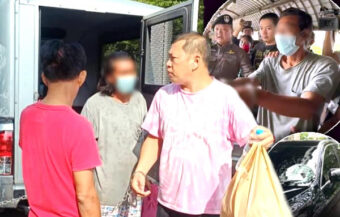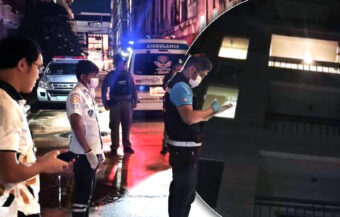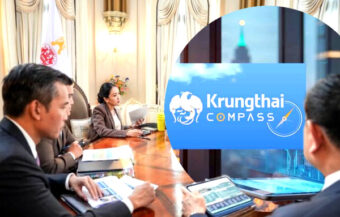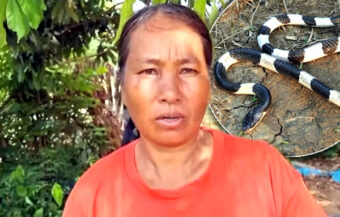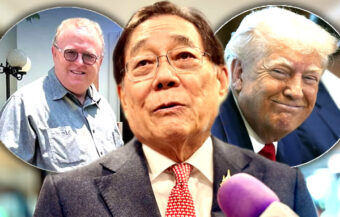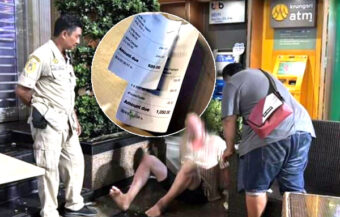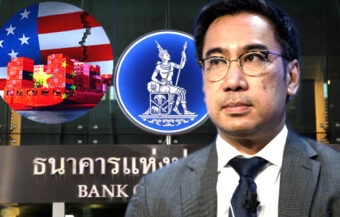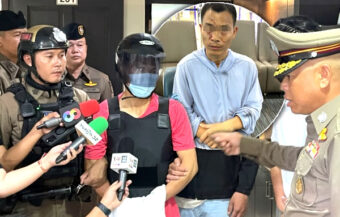The move is coming at a time when support for the government has hit a low ebb with a poll published last weekend showing that 77% have lost confidence in the coalition administration of Prayut Chan ocha and an increasingly fractious political environment with a General Election seen now as more likely in 2022.
Last Friday, the Thai Digital Economy and Society Minister Chaiwut Thanakhamanusorn appeared to resurrect plans first mooted by the military junta up to 2015, to install a national internet gateway in Thailand to control and restrict access to external online content as an issue of national security. The minister cited a rise in criminal complaints concerning illegal online scams and gangs operating from outside the kingdom from bases in Cambodia as reasons for the move which would be similar to a proposal also being pursued by Cambodian authorities and interpreted by many analysts as introducing a Chinese approach to internet control, policing and regulation.
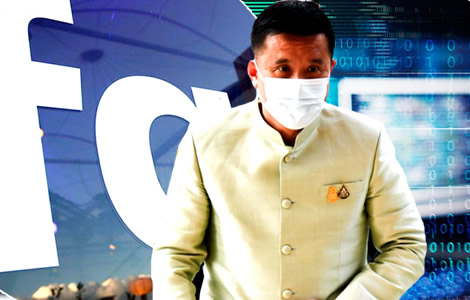
On Friday last, speaking in the House of Representatives, the country’s Digital Economy and Society Minister, Mr Chaiwut, again raised the possibility that Thai authorities may pursue a single gateway for internet access to websites and traffic outside of Thailand.
The possibility of such a move has been largely let in abeyance since 2015 when the junta maintained its determination to impose a single portal connecting the country’s internet to the rest of the world.
Plan approved on February 1st for provincial fake news centres and control at different levels of society
The minister, only appointed last year after his predecessor in the role, Mr Buddhipongse Punnakanta, was handed down a jail term by the Criminal Court in Bangkok on insurrection charges for his part in virulent street protests from 2013 to May 2014 which culminated in the coup that year, has since pursued a policy combating fake news and what the government sees as a threat to the stability of the kingdom posed by the internet.
On February 1st last, the cabinet approved plans by the Digital Economy and Society Ministry to set up provincial fake news centres and extend the fake news operation established by Mr Buddhipongse in association with Deputy Prime Minister Prawit Wongsuwan, the Palang Pracharat Party leader, in November 2019, to different levels in society.
Current government has repeatedly made forays to extend its power to regulate online news output
Since then, the Thai government has repeatedly mooted plans and initiatives to extend its control over news commentary in the kingdom with a proposal in February 2020 for a central news service to coordinate and control the flow of news linked with emergency situations that develop within the country.
That proposal was for a news pool or centrally appointed news agency to control and restrict commentary on such situations, drew a less than enthusiastic response from the media establishment in Thailand.
Fake news a low priority for the public during this unprecedented emergency says Suan Dusit poll
This followed several high profile atrocities in the kingdom including an attack and massacre by an off duty soldier Sergeant Major Jakraphanth Thomma on February 8th 2020 in which 30 people died at the Terminal 21 Shopping Centre in Korat, Nakhon Ratchasima.
It also came at a tense time when the country began to confront the extent of the COVID-19 crisis facing it.
Fake news is not a priority issue for the public
In January 2020, an opinion poll by Suan Dusit Rajabhat University found that only 14% of the public considered fake news as a priority problem to be tackled by the government.
On Friday last, Minster Chaiwut, however, proposed a national gateway for controlling inbound international traffic primarily as a security measure to protect the public from the growing menace of cybercrime and to counteract what he termed illegal content aimed at vulnerable audiences in the country.
Minster Chaiwut quoted an internal study by officials into the situation which he said had identified a need, also, for changes to the country’s Computer Crime Act 2007 which was updated in 2017.
Minister Chaiwut proposes a new internet gateway mainly as a security measure to prevent online crime
He said the gateway and proposed legal changes were to improve online safety for Thai internet users and referred to a surge in crime perpetrated on users by internet fraudsters and gangs online.
He especially referenced Thailand’s neighbour Cambodia as the source of such activities.
‘Along with considering amending the Computer Crime Act, the government is studying the possibility of using a single internet gateway as a tool to better control the flow of illegal information online to improve the safety of internet users,’ he explained. ‘The government has been working to curb cybercrime. Over the past year, police have busted 3,000 to 4,000 such cases with the help of their Cambodian counterparts.’
Minister Chaiwut told his parliamentary and media audience that a crackdown was underway on such gangs targeting Thai users from Cambodia and thanked the authorities in the neighbouring kingdom for their cooperation and help in hunting down such gangs so that they may face justice in Thailand.
Internet gateway plan first raised by the junta government after the 2014 coup but ran into a wall of criticism based on human rights and business efficacy
The proposal for a national internet gateway in Thailand was first pursued seriously in 2015 after the National Council for Peace and Order, the former military junta, came to power in the 2014 coup.
The proposal was doggedly adhered to by government officials in 2015 even as it ran into a wall of complaints and criticism from both the private sector and internet operators in Thailand including foreign firms.
As well as being seen as a regressive step in terms of human rights and freedom of expression in Thailand, the move towards a national internet gateway is seen also as posing a technical challenge to media and digital business operators in the country as it will result in lower internet speed times as well as other potential network complications because of the lack of flexibility associated with such an architecture.
Thailand is currently in the middle to lower half of the table when it comes to worldwide internet speeds being ranked from 82 to 72 in 2020 and 2021 surveys among 100 countries worldwide.
Former minister warned the move would stifle Thailand’s plans to become a regional digital hub
In 2015, when the government appeared to be pursuing the national internet gateway proposal, a former Pheu Thai Party Minister for Information and Communication Technology, Anudith Nakornthap, warned that the proposal would seriously hamper any hopes the kingdom had of becoming a digital technology hub in Southeast Asia.
Technical experts have also warned that a single gateway scheme or plan for connecting the kingdom to the world will substantially increase the risk of glitches and the possibility of firms connecting with sites and services outside the kingdom experiencing technical problems.
National internet gateway seen as a Chinese approach to internet control and censorship in realpolitik
The move has also been roundly criticised by press representative groups as a significant step backwards for Thailand’s stated goal of improving human rights and its adherence to higher democratic values.
In realpolitik terms, the plan for a national internet gateway portrays Thailand as a country that is increasingly importing Chinese norms in terms of governance.
On the other hand, Thai officials, in defence of the proposal, are portraying this in terms of an effort to improve security for Thai internet users and argue that a central internet portal will make the internet safer by allowing authorities to identify and eliminate bad actors.
There is a strong element of public opinion in Thailand that increasingly believes that foreign influence in the kingdom and particularly the increasing consumption of social media in the country has brought with it social ills, divisiveness and internet crime.
Shock poll shows the Thai public is suspicious of third parties behind the kingdom’s current political unrest
This week, in Cambodia, similar sentiments were expressed by the Minister of Foreign Affairs in that kingdom when commenting on media coverage of ‘misrepresentations’ of that government’s policy to pursue the National Internet Gateway as having nothing to do with the curtailment of free speech.
Cambodia’s defence of its National Internet Gateway plans is based on offering citizens more security
‘On the contrary,’ the ministry said, ‘the government respects the individual’s right to privacy and freedom of expression and protects personal data, all of which are enshrined in laws, the constitution, ratified international human rights treaties, the civil code, the criminal code, and the law on telecommunications.’
The resurrection of the proposal here comes as Thailand’s political situation has become increasingly fraught with the possibility of an election in the kingdom and with support for the government at a low ebb.
A Suan Dusit survey last Sunday published in the Bangkok Post and carried out by Suan Dusit Rajabhat University suggested that nearly 77% of the public have lost all confidence in the government with a by-election held on January 30th highlighting a surge in support for the Pheu Thai Party and other opposition parties in the capital, traditionally a government stronghold and in a constituency that the coalition’s ruling Palang Pracharat Party won in 2019.
Government is in its death throes as divisions multiply with July likely to be a decisive month for the country
The increasingly fractious political situation has raised the odds of Thailand facing an election this year or even a crisis.
Cambodia’s National Internet Gateway was postponed last week over fears of severe online disruption
In Cambodia, authorities there say that country’s proposed national internet gateway system would be used to boost revenue collection, better regulate internet providers and tackle cybercrime.
The proposal comes just days after a similar National Gateway modelled on China’s ‘Great Firewall’ which controls and censors internet access in communist China, was due to be implemented last Tuesday the 16th in Thailand’s eastern neighbour following an order issued by the country’s prime minister and de facto ruler Hun Sen, one year ago, on February 16th 2021.
The move, however, did not go ahead as planned last week.
Meas Po, a spokesman for the Cambodian Ministry of Posts and Telecommunications told the media that the decision to postpone the implementation of the National Internet Gateway (NIG) was taken due to issues related to COVID-19 and fears that this could lead to severe disruption of the kingdoms’ s internet operations.
‘We have to prepare to install and order equipment in order to prepare and create the gateway. And we have to give licences to any company that the government understands that has the ability to create the gateway,’ Mr Meas Po, a Secretary of State, disclosed. ‘That’s why it can affect the traffic.’
Cambodia’s plan is vehemently opposed by technology firms with the Asian Internet Coalition warning of ‘significant repercussions’ if turned on
The proposed National Internet Gateway (NIG) in Cambodia has drawn widespread opposition including a statement from the Asian Internet Coalition in January, a regional trade body that includes Apple, Google, Facebook and Amazon among its members. The group warned that the move would have ‘significant repercussions’ for Cambodia.
‘We urge the Ministry of Post and Telecommunications to take the time to hear the concerns of industry experts and stakeholders,’ said the body’s managing director, Jeff Paine, in a press statement. ‘The NIG decree will restrict Cambodians’ ability to access a free and open internet and greatly harm the country’s nascent digital economy.’
National gateway would give Thai authorities a chokehold over the internet and an ability to ban sites
A national gateway here would give Thai authorities what technical experts have described as a ‘choke hold’ over the country’s internet traffic. This could be particularly aggravated by legal changes which may allow officials the power to bypass the courts to deploy blocks or bans on certain online media.
The plan would see all internet traffic routed through one single portal which would be managed and regulated by the government in Thailand.
Commenting on Cambodia’s planned National Internet Gateway (NIG), human rights groups there have dismissed the government’s claims that the move was linked to ‘security, social order, culture, traditions and customs’ in defence of the proposal. These are seen as codewords or parlance used by the country’s ruling Cambodian People’s Party to suppress political opposition within the country.
Opposition groups and activists have linked the proposed gateway to China’s steadily rising influence in Cambodia which is increasingly seen as a one-party political state ruled by Prime Minister Hun Sen who has held office for thirty-seven years and has been prime minister for over 23 years.
Cambodia’s plan is being seen as political repression just as the Chinese Communist Party and state apparatus in Beijing has used its internet controls
China has, in recent years, under the leadership of Xi Jinping, enhanced its internet censorship capability as the communist country has become more nationalistic and cut off with entrenched anti-western views on the rise.
In Cambodia, analysts see the significant gains made by the opposition nine years ago in the 2013 election there, which gave the government a scare, as driven by social media agitation.
In 2018, Prime Minister Hun Sen re-established his authority in a controversial landslide election win with 80% of the vote in what is widely seen and interpreted as a rigged election largely boycotted by the opposition, when he garnered 80% of the vote and 100 out of 125 seats on a reported 82% turnout.
The vote was endorsed by regional countries but widely condemned by the United States, Canada, Australia and the European Union.
Thai authorities already have strong powers to exercise control over the internet since the coup
The resurrection of plans by the Thai government for a National Internet Gateway, at this time, comes after authorities in the kingdom from 2017 to 2018 increasingly enhanced the government’s control over the internet by requiring all internet account users to supply id and by using the powerful provisions of the Computer Crime Act and the powers vested in the National Broadcasting and Telecommunication Commission (NBTC) which licences all media players and internet service providers in Thailand, to comply with already robust legal restrictions on free speech laid down by the country’s civil and criminal code.
Since the 2014 coup, Thailand’s standing in relation to a free press has deteriorated even as the population has become more engaged with politics and more aware of the media environment.
Press freedom has declined despite repeated efforts to defend against the government’s encroachments
Thailand currently ranks 137th out of 180 countries in a free press ranking for 2021 published by Reporters Without Borders (RSF) in April 2021.
The outcome was a slight improvement on 2020 when the country was ranked 140th and followed efforts by Prime Minister Prayut Chan ocha to improve relations with the media and assurances on press freedom.
The country’s overall standing has plummeted since the 2014 coup when it was ranked a respectable 59th out of 167 countries in the same Press Freedom Index.
Last year, the prime minister was the subject of a court injunction in August when his attempt to use a regulation or order under the Emergency Decree to suspend internet news sites that published what the government considered to be fake news or false commentary by instructing the National Broadcasting and Telecommunications Commission (NBTC), was thwarted by court action undertaken by civil rights groups.
An injunction was handed down by the court suspending the order.
Last year’s emergency order was a response to the COVID crisis amid genuine concerns held by Thai public officials about dangerous misinformation
The move followed the government’s concerns, at that time, over the escalating COVID-19 situation and media reporting of the crisis.
There were genuine concerns held within the Centre for Covid-19 Situation Administration (CCSA) that the public was being misled and confused by an excess of reporting and misinformation.
Top official has meetings with TV station news chiefs on how news of the crisis is being reported
The court, however, found that suspension of the order did not pose a problem for the government in its ability to handle the crisis and to communicate with the public in respect of the emergency situation.
It viewed the order as a contravention of Section 35 of the constitution upholding free speech.
‘It is in the view of the Court that, considering the existence of several legal instruments establishing the measures concerning illegal dissemination of information and the government’s capability to educate people, develop a public better understanding and examine false information, the suspension of the enforcement of such regulation does not pose any obstacle to public administration in emergency situations and public interest,’ the court declared.
Facebook shut down in Thailand for 30 minutes
On the 28th of May 2014, just days after the coup, Thailand shut off the social media site Facebook in the country for 30 minutes at a time when the network had over 22 million users.
The Information and Communication Technology Ministry later described the event as a technical glitch but this came after a statement from the ministry initially confirming it had blocked the site: ‘We have blocked Facebook temporarily and tomorrow we will call a meeting with other social media, like Twitter and Instagram, to ask for cooperation from them. Right now there’s a campaign to ask for people to stage protests against the army so we need to ask for cooperation from social media to help us stop the spread of critical messages about the coup.’
The confusion led to a contretemps two days later when the National Broadcasting and Telecommunications Commission appeared to upbraid the Norwegian firm Telenor, a significant investor in Total Access Communication Plc (DTAC) when that internet service provider confirmed that it had been ordered to restrict Facebook.
‘If Thailand has such great problems, Telenor should invest in another place,’ the regulatory agency said in a broadside against the company.
Experts surmise the problem was either linked to a breach of the site’s security protocol or a simple block
It has since been suggested by some technical analysts that the outage of Facebook was linked to the HTTPS security protocol on the worldwide social network and what some experts interpret as an effort to avoid such encryption which would allow access to decrypted data or communications while others have interpreted it as a test to ensure that the network can be shut off by authorities in the kingdom as a matter of last resort.
Pornhub is shuttered in Thailand as Ministry blocks access online to its 10th largest market in the world
Thai minister defends ban on world adult site Pornhub as move sparks nationwide protests against the move
In November 2020, when Thailand blocked the porn site Pornhub, that service was blocked on HTTPS but was still functioning for some time on the HTTP protocol.
The Digital Economy and Society Ministry made no apologies for its action in that case which led to some colourful protests from irate users of the site in Bangkok.
Thailand was the adult content site’s 10th largest market.
Court orders to shut down content on Facebook and other services have been sought and obtained
In August 2020, Facebook, on foot of a government and court order, blocked access to a Facebook page in Thailand with over 1 million users which regularly published content critical of the country’s monarchy.
This followed a showdown with the internet giant in May 2017 where the government wrote to the Thai Internet Service Provider Association (Tispa) warning that its members must immediately take steps to shut down access in the kingdom to Facebook on the 16th May 2017 in an instruction issued days before, if it failed to remove access to 131 linked pages on the site.
Facebook had earlier complied with the government and removed 178 posts or pages from a list of 309 handed to it.
Threat to shut down Facebook again in 2017
The instructions to the internet service providers, if carried out, would have cut off access to the CDN or content distribution network of Facebook leaving users with an internet error.
However, despite the internet giant’s failure to remove the content in Thailand, the social network, which opened a Thai office and subsidiary operation in the kingdom in 2015, remained online without disruption.
10 days earlier, however, the kingdom was left without access to Google, Gmail, YouTube in what service providers told the Thai public was a glitch caused by maintenance problems.
When Facebook opened its base in Thailand in September 2015, the company’s Vice President for the Asia Pacific, Dan Neary, told the press that Thai users used the service three times longer than the average global user for the network.
The social network had over 30 million users, a figure which had grown to over 51 million by 2020.
Plans to shut off Telegram emerged during street protests in 2020 as the government was forced to retreat in its attempts to close down online news sites
In October 2020, a leaked official document marked ‘very confidential’ was shared on social media detailing the government’s plans to cut off access to the popular Telegram messaging app which, it was reported, had been used widely in anti-government street protests which erupted in Bangkok that month.
At the same time, the government took action against four media outlets Voice TV, Prachatai, The Standard and The Reporters in court to have the media outlets shut down for their coverage of the street protests.
Initially, the then Digital Economy and Society Minister, Mr Buddhipongse said that the Criminal Court in Bangkok had granted the government such an order under an emergency regulation promulgated a week earlier but on October 21st 2020, the Criminal Court rejected the government’s application on the basis that it represented an infringement of Article 35 of the 2017 Constitution concerning press freedom.
Join the Thai News forum, follow Thai Examiner on Facebook here
Receive all our stories as they come out on Telegram here
Follow Thai Examiner here
Further reading:
Voice TV ordered shut by a Thai court as action against media outlets proceeds despite assurances
Minister warns Facebook of possible legal action including Computer Crime Act criminal charges
Facebook under investigation over translation blunder as minister criticises the social network
Press conference given by activist and Progressive Movement leader checked by abrupt police visit
Rally’s march on Government House surprises officials with a larger turnout and police in retreat
Smaller crowd expected at rally on Wednesday as police gear up security cordon with checkpoints
Police say students have no permission to protest as army chief warns that security will be upheld
Criminal charges likely against student leaders as mysterious ‘People’s Party’ plaque goes missing
Western foreigners being blamed by ultra-right for this latest wave of radical student protests
Raised concerns for the defiant student protest being planned for next Saturday and Sunday
Army chief denies and rejects rumours of a likely coup as the country faces crisis on key fronts
Shock resignation of Minister of Finance a sign of more politics being demanded in government
Thailand stuck in a ‘vicious cycle’ which will lead to further military coups says leading academic
New ministers take the reins in a formal audience with King Rama X & Queen Suthida at Dusit Palace
Warning signs in new banking and employment reports as virus crisis hits Thailand’s bottom line hard
June export figures show a 23% decline on last year but the economy will recover by end of 2021
Prime Minister indicates that the cabinet reshuffle will be complete very shortly with no problem
Somkid ready to bow out of government as September cabinet reshuffle seems to be on the cards
Election of Prawit as Palang Pracharat leader will see more grassroots politics in government


